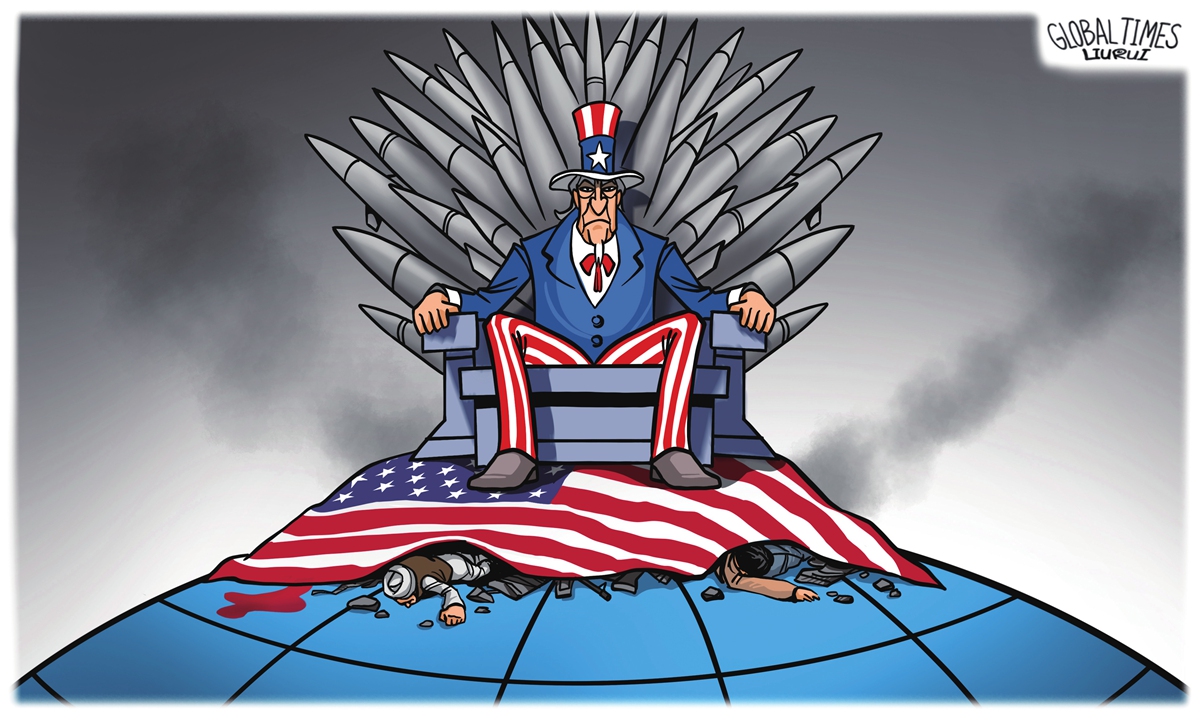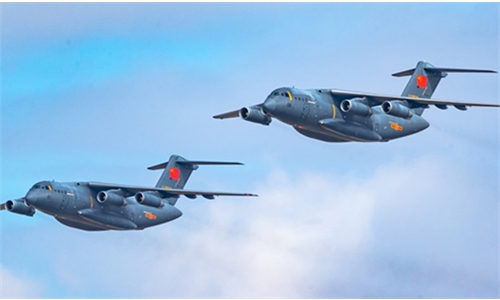US’ unlimited greed for military power serves as a warning to other countries

House of Hegemony Illustration: Liu Rui/GT
President Biden will propose a $835 billion defense budget for the 2024 fiscal year on Thursday US time. How staggering is this number? It is about twice the GDP of Vietnam and half of South Korea's GDP. It is approximately 10 times the military spending of the third-largest defense budget in the world, and about four times of China's defense budget. Of this military budget, $145 billion will be allocated for new weapon research and development, and $170 billion will be used for weapons and ammunition procurement. This is the largest peace-time defense budget in the US. From 2013 to 2018, US' annual military spending dropped to below $700 billion, including $633.8 billion in 2015, but nowadays, US' military spending has increased by more than $200 billion than in 2015.The US government claims that this is only the largest nominal dollar amount for military spending, as in 2008 when the country fought two wars in Iraq and Afghanistan simultaneously, the scale of weapon procurement, if calculated in today's dollar, was over $200 billion. However, this self-deceiving calculation cannot deceive the world.
The fact is that the US' defense budget accounts for about 40 percent of global total. The US is the world's leading military power, with its military spending accounting for around 3.5 percent of its GDP. Only a few countries at war have such a high proportion of military spending, and China's military spending accounts for less than 1.5 percent of its GDP. The US has kept such a large military budget for many years, coupled with its status as the world's leading superpower, not only sets a bad precedent, but also has shaped the basic pattern of international relations with power and force.
China has long been identified by the US as its top strategic competitor, and the US' crazy increase in military spending is bound to put a lot of pressure on China. The US has pushed military competition to a prominent position in major power relations, which sent a message to the world that military strength is a trump card in the game between major powers.
Some people say that although the US has strong military capabilities, it has not actually used them, for example, the US didn't strike any country using nuclear weapons after the WWII. This kind of argument is extremely naive. The US uses its massive military power every day, even every minute, to shape the world's attitude towards the US and coerce other countries to accept a global system that revolves around US interests. It is because of such a huge military budget that the US dollar has its super status and that the US can call on its global network of allies. Military spending is seen by the US as the most profitable investment.
Now, the primary target of the US' massive military spending is China. The latest Annual Threat Assessment by the Director of National Intelligence listed various "threats" posed by China. The US is obviously aiming at maintaining an overwhelming military advantage over China in the long term, including having the absolute certainty of defeating the People's Liberation Army in China's offshore waters.
China won't engage in an arms race with the US, but the unlimited greed of the US to continue expanding its military power at its peak should serve as a warning to us. We need to formulate and improve our own military development plan, achieving more with less, and form an asymmetrical, but sufficiently effective deterrent against the US with a military budget and total military force smaller than the US'. We have no intention of confronting the US in the Pacific, Indian, or the Atlantic Ocean, but we must ensure that our military capabilities in China's offshore waters overwhelm the overall military capabilities that the US and its allies can mobilize in this region. The military posture in this region must fundamentally change over time. China will invest as much military budget and other resources as necessary to achieve this goal. This is not an arms race with the US, but a legitimate and just measure to address China's national security.
The US military budget is aimed at global hegemony, but there are many factors in regional military games that cannot be replaced by global games. In the waters near China, whether it is a naval battle or an aerial battle, it is difficult for the US to extend its reach, so the US military's confidence has been shaken in winning over PLA in the Taiwan Straits and in the South China Sea. We will eventually strip them of this confidence completely.
Being the world's second strongest country is inevitably full of risks, especially when the No.1 country is a thorough imperialist, China cannot afford to be even slightly lax in its military preparedness, or we will lose the overall game. At the same time, we cannot walk into the dead end of a comprehensive arms race with the US, as it will be a hopeless dead end. China needs to have sufficient military power to deter the US from its wild ambition of engaging in military blackmail against China, and force it to compete with us in non-military areas, where the strategic game between the two countries is ultimately decided. This pattern has already begun to take shape, and what China needs to do is to continue to strengthen this pattern, and finally let diligence and wisdom determine who is stronger and who is weaker between China and the US in the future.
The author is a commentator with the Global Times. opinion@globaltimes.com.cn


